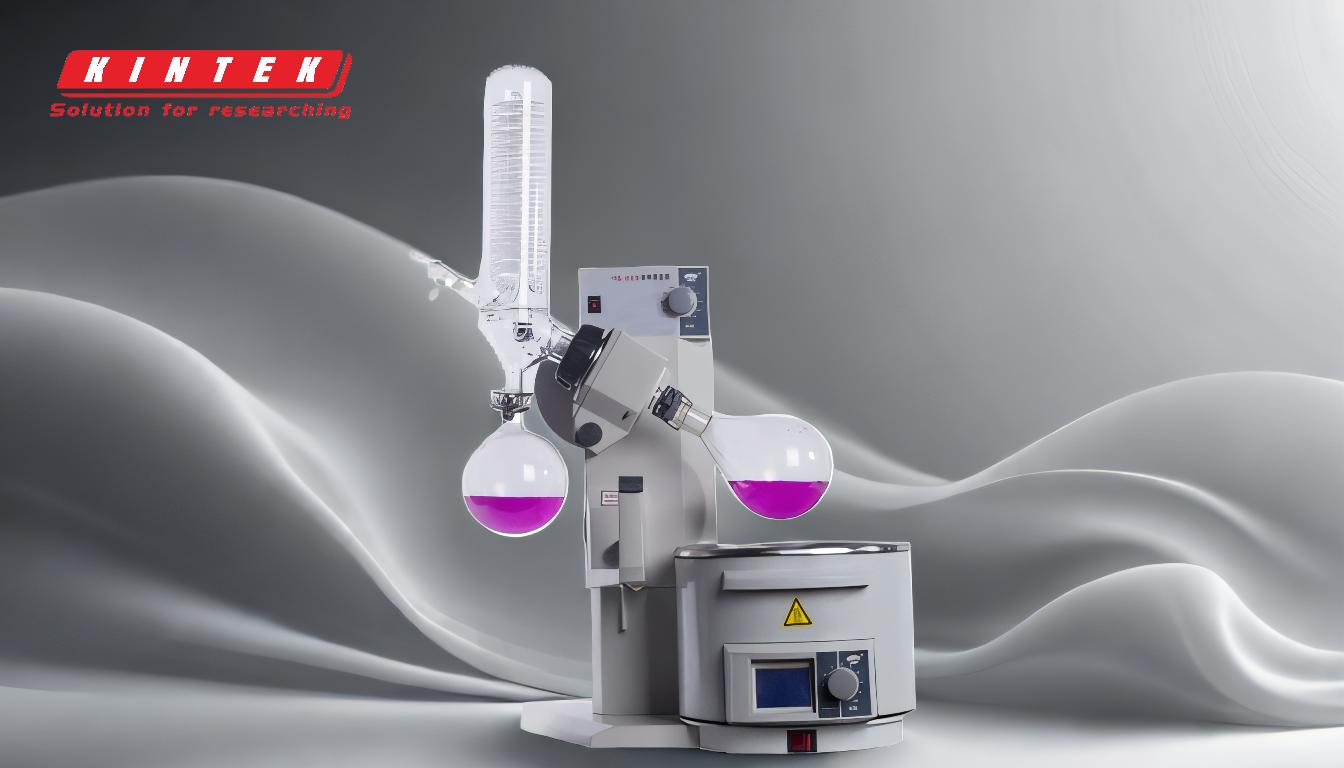When the pressure is reduced in a rotary evaporator, the boiling points of the solvents in the mixture are lowered. This allows the solvents to evaporate at much lower temperatures than they would under normal atmospheric pressure. This process is crucial for handling heat-sensitive materials, as it prevents thermal degradation or "cooking" of the contents. By operating under reduced pressure, the rotary evaporator ensures efficient solvent removal, saves energy, and preserves the integrity of delicate compounds such as aromas and flavors. The vacuum pump plays a key role in maintaining this low-pressure environment, enabling the process to be both time-efficient and gentle on the materials being processed.
Key Points Explained:

-
Reduction of Boiling Points:
- Lowering the pressure in a rotary evaporator reduces the boiling points of the solvents in the mixture. This is because the vapor pressure required for boiling decreases under reduced pressure.
- For example, a solvent that normally boils at 100°C at atmospheric pressure might boil at 40°C under vacuum. This allows for evaporation at much lower temperatures, which is essential for heat-sensitive materials.
-
Preservation of Sensitive Compounds:
- By operating at lower temperatures, the rotary evaporator prevents thermal degradation of sensitive compounds such as aromas, flavors, and other delicate molecules.
- This is particularly important in industries like food science, pharmaceuticals, and essential oil extraction, where maintaining the integrity of the compounds is critical.
-
Energy and Time Efficiency:
- Lowering the pressure reduces the amount of heat energy required for evaporation, making the process more energy-efficient.
- Additionally, evaporation occurs more quickly under reduced pressure, saving time compared to traditional distillation methods.
-
Role of the Vacuum Pump:
- The vacuum pump is essential for maintaining the reduced pressure environment within the rotary evaporator. It ensures that the pressure remains low enough to facilitate efficient evaporation at lower temperatures.
- The vacuum system also helps to remove vapors from the system, preventing re-condensation and ensuring continuous evaporation.
-
Application in Solvent-Solute Separation:
- The ability to evaporate solvents at lower temperatures is particularly useful for separating solvents from heat-sensitive solutes. This is crucial in chemical synthesis, where some compounds may decompose or react undesirably at higher temperatures.
- For example, in the pharmaceutical industry, this process is used to isolate active pharmaceutical ingredients (APIs) without damaging their molecular structure.
-
Prevention of "Cooking" Contents:
- By operating at lower temperatures, the rotary evaporator prevents the "cooking" or overheating of the contents. This ensures that the final product retains its desired properties, such as flavor, aroma, or chemical stability.
- This is especially important when working with organic compounds or natural extracts, where excessive heat can alter the composition and quality of the product.
-
Enhanced Control Over the Evaporation Process:
- The combination of reduced pressure and controlled heating in a water bath allows for precise control over the evaporation process. This ensures consistent results and minimizes the risk of over-evaporation or incomplete separation.
- The rotation of the flask further enhances the process by increasing the surface area of the liquid, promoting even heating and efficient evaporation.
-
Versatility Across Industries:
- The ability to operate under reduced pressure makes the rotary evaporator a versatile tool across various industries, including chemistry, biochemistry, food science, and environmental analysis.
- For example, in environmental testing, it is used to concentrate samples for analysis, while in the perfume industry, it is used to extract and concentrate essential oils without damaging their aromatic properties.
By understanding these key points, a purchaser can appreciate the importance of pressure reduction in a rotary evaporator and how it contributes to the efficiency, precision, and versatility of the equipment. This knowledge is essential for selecting the right rotary evaporator for specific applications, particularly those involving heat-sensitive materials.
Summary Table:
| Key Benefit | Description |
|---|---|
| Reduction of Boiling Points | Lowers solvent boiling points, enabling evaporation at lower temperatures. |
| Preservation of Compounds | Prevents thermal degradation of aromas, flavors, and delicate molecules. |
| Energy and Time Efficiency | Reduces heat energy needed and speeds up evaporation under reduced pressure. |
| Role of Vacuum Pump | Maintains low pressure, ensuring efficient and gentle evaporation. |
| Solvent-Solute Separation | Safely separates solvents from heat-sensitive solutes without damage. |
| Prevention of 'Cooking' | Avoids overheating, preserving product integrity and quality. |
| Enhanced Control | Combines reduced pressure and controlled heating for precise evaporation. |
| Versatility Across Industries | Used in pharmaceuticals, food science, and environmental analysis. |
Want to learn more about rotary evaporators and their benefits? Contact us today for expert advice!











